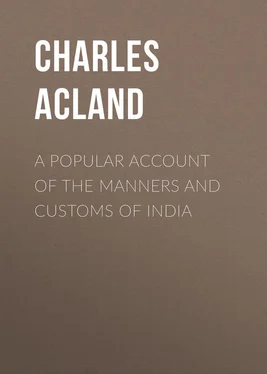Charles Acland - A Popular Account of the Manners and Customs of India
Здесь есть возможность читать онлайн «Charles Acland - A Popular Account of the Manners and Customs of India» — ознакомительный отрывок электронной книги совершенно бесплатно, а после прочтения отрывка купить полную версию. В некоторых случаях можно слушать аудио, скачать через торрент в формате fb2 и присутствует краткое содержание. Жанр: foreign_antique, foreign_prose, Путешествия и география, на английском языке. Описание произведения, (предисловие) а так же отзывы посетителей доступны на портале библиотеки ЛибКат.
- Название:A Popular Account of the Manners and Customs of India
- Автор:
- Жанр:
- Год:неизвестен
- ISBN:нет данных
- Рейтинг книги:5 / 5. Голосов: 1
-
Избранное:Добавить в избранное
- Отзывы:
-
Ваша оценка:
- 100
- 1
- 2
- 3
- 4
- 5
A Popular Account of the Manners and Customs of India: краткое содержание, описание и аннотация
Предлагаем к чтению аннотацию, описание, краткое содержание или предисловие (зависит от того, что написал сам автор книги «A Popular Account of the Manners and Customs of India»). Если вы не нашли необходимую информацию о книге — напишите в комментариях, мы постараемся отыскать её.
A Popular Account of the Manners and Customs of India — читать онлайн ознакомительный отрывок
Ниже представлен текст книги, разбитый по страницам. Система сохранения места последней прочитанной страницы, позволяет с удобством читать онлайн бесплатно книгу «A Popular Account of the Manners and Customs of India», без необходимости каждый раз заново искать на чём Вы остановились. Поставьте закладку, и сможете в любой момент перейти на страницу, на которой закончили чтение.
Интервал:
Закладка:
When on any occasion I ask for a glass of cold water it is brought to me with a lump of ice in it. This is excessively refreshing in a country like this, where the thermometer is at 90°. It is brought in shiploads from America. At new and full moon there is what is called a "bore" in the river Hoogly, that is, the tide, instead of coming up gradually, swells up in one large wave. When I saw it the other day it rose thirty feet in height.
Midnapore, September 12, 1842
On the 14th of August I sent two boats full of furniture to Midnapore, and on the 16th we started ourselves in a boat with two large cabins and one small. I had nine Indians to manage it. Another smaller boat contained our palanquins, two servants, and a little sort of kitchen.
In going down the Hoogly river we met with an accident, and were nearly overturned; the wind drove us with great force against a large ship in a severe squall. We however reached Ooloberriab, a native village on Hoogly, in safety. Here we turned into a canal, up which we journeyed for some miles, and then anchored for the night. The next morning, having slept on board, we proceeded on our course, and reached the Khatah Ghat, or landing-place (pronounced gaut), at about twelve o'clock. Here we remained until four in the afternoon, entered our palanquins, a kind of square boxes, which are carried on men's shoulders, handsomely painted outside, with soft cushions inside, and lamps like a carriage. In this sort of thing we move about everywhere, and in crossing a river do not wet our feet. To each palanquin there are eight bearers, four of whom are employed at a time; one mussuaulchee, or torch-bearer, runs by the side, along with one baugh-whaller, to carry boxes made of tin, and called patarahs. Each man carries two slung to a stick over his shoulder.
My wife travels in one palanquin, and I in another. We had taken care to write beforehand that a dâk, or men, might be in readiness to carry us on at each stage; and we therefore proceeded rapidly through the whole night.
Soon after leaving Khatah Ghat we found the road for two miles under water, which reached far above the men's knees; and at one time, indeed, I was afraid it would have entered the palanquin; but the only accident that actually happened was the breaking of one of the baughley-whaller's sticks, and the tin patarah, containing clothes, floated away, but, after some trouble, was again secured. We slept most comfortably in our palanquins during our journey, and arrived at Midnapore early in the morning. Here we stayed at the house of the judge until I could choose a home for myself, in which we are now at last settled. Everybody here is most kind and hospitable, and, indeed, it is necessary it should be so, for, excepting in Calcutta, there are no inns, and travellers would fare very badly were the houses of the principal people closed against them. But when you go on a visit you must be careful to take your own servants, sheets, towels, and soap. My house is called a bungalow, which I chose as being the most economical. A bungalow is a thatched cottage, with only one ground story.
The floors of the rooms are not made of wood, but a sort of cement which looks like stone. The house stands in the midst of a large field called a compound, which belongs to me, and the servants' dwellings are scattered around.
I have a flower and kitchen garden, fowl-house and place for goats, kitchen, stable, cowhouse, and a banyan-tree. The pathways through the grass are of fine gravel, and the hedges are composed almost entirely of aloes and cactuses, mixed with a very sweet-smelling flowering shrub, and here and there a bamboo, which is a most beautiful tree, resembling a very tall weeping-willow. The sensitive-plant grows wild about the compound, and bears a very pink flower resembling that of the red cloves.
The banyan-tree is abundant here. Each branch projects stalks downwards, which take root in the earth, and after a few years one tree resembles a cluster, and covers a large space of ground. I have several aloes in my garden, which are just flowering. They have thrown up a straight stalk about twenty feet high. A large cactus is now in bloom. It is about ten feet high, and each stem or leaf is thicker round than my leg. This kind bears a very beautiful large white flower, which opens only at night. In my kitchen-garden are the mango, the plantain, Indian corn, pine-apple trees, and many others.
Carpets are not used here, but the floors are covered instead with India matting. In each room is a punkah, which I have before described.
We procure water for drinking from a large tank or pond; and as we cannot purchase meat, I have provided myself with thirty-five ducks, sixty fowls, four goats, and three kids, which last are almost ready to eat; the goats we shall keep for their milk. The judge made me a present of a beautiful fawn of the spotted deer, which is becoming very tame. I am just going to join a mutton-club. Four persons enter into partnership, and agree to keep a small flock of sheep; one of which is killed twice a week, and then each partner is provided with a quarter of mutton, and each in turn has the liver, heart, and head. A gentleman yesterday sent me four guinea-fowls, and another has promised me six pigeons as soon as I have a place to keep them in.
I have just begun to make a collection of insects, snakes, and butterflies and moths, of the most beautiful kind. The chameleon is very common, and changes its colour according to the temper it is in. I have one which is generally of a brilliant green; but if its anger be roused, it becomes covered with large black spots, and when hungry with white spots. These are the only changes in its colour I have as yet observed: but I have seen others yellow; others, again, black, with yellow spots. It is said that each chameleon has ten different variations of colour. There is to be seen here a light-brown lizard, called the bloodsucker, which is constantly running about the walls in the rooms. Whenever we take up a paper or a book, we are sure to find two or three cockroaches under it – not such cockroaches as you may see in England, but great ones three or four inches long. The grasshoppers come into the house in numbers, and grow to an uncommon size. You may hear them chirruping half a mile off. The ants, of which there are three sorts, are a great nuisance. Every house swarms with them; and unless the legs of tables, drawers, &c., are kept constantly standing in jars of water, they attack the dinner-cloths, and in fact everything they can reach: 1st, there is a very small red ant, whose bite causes a very hard red swelling, which continues very painful for some days; 2nd, a great black ant, about the size of an English wasp, which bites, but does not sting; 3rd, the white ant, rather larger than the common English ant, which come in a swarm, and in one night will devour a table or a shelf full of books. You may come down in the morning and find your table and books apparently all right, but no sooner do you touch them than they all crumble away to powder.
There are a great number of snakes about here, though I have not yet seen one. I suspect that my mungoose or ichneumon keeps them away, as he is an inveterate enemy to all vermin. A venomous lizard, about a foot long, black, with yellow stripes down the sides, often comes into our verandah, but as soon as it hears the mungoose it disappears with all possible despatch; as do also the poisonous centipedes, of which there are several in the house. The noise of the mungoose is very peculiar, generally purring like a cat, but when angry it barks short and snappishly, while every hair on its long tail stands on end.
I have already mentioned to you that there are here the tiger, the lion, the monkey, the leopard, the buffalo, the elephant (tame), the spotted deer, the jackal, the flying fox: all these I shall describe as the opportunities offer; now I shall tell you something about the monkey.
Читать дальшеИнтервал:
Закладка:
Похожие книги на «A Popular Account of the Manners and Customs of India»
Представляем Вашему вниманию похожие книги на «A Popular Account of the Manners and Customs of India» списком для выбора. Мы отобрали схожую по названию и смыслу литературу в надежде предоставить читателям больше вариантов отыскать новые, интересные, ещё непрочитанные произведения.
Обсуждение, отзывы о книге «A Popular Account of the Manners and Customs of India» и просто собственные мнения читателей. Оставьте ваши комментарии, напишите, что Вы думаете о произведении, его смысле или главных героях. Укажите что конкретно понравилось, а что нет, и почему Вы так считаете.












